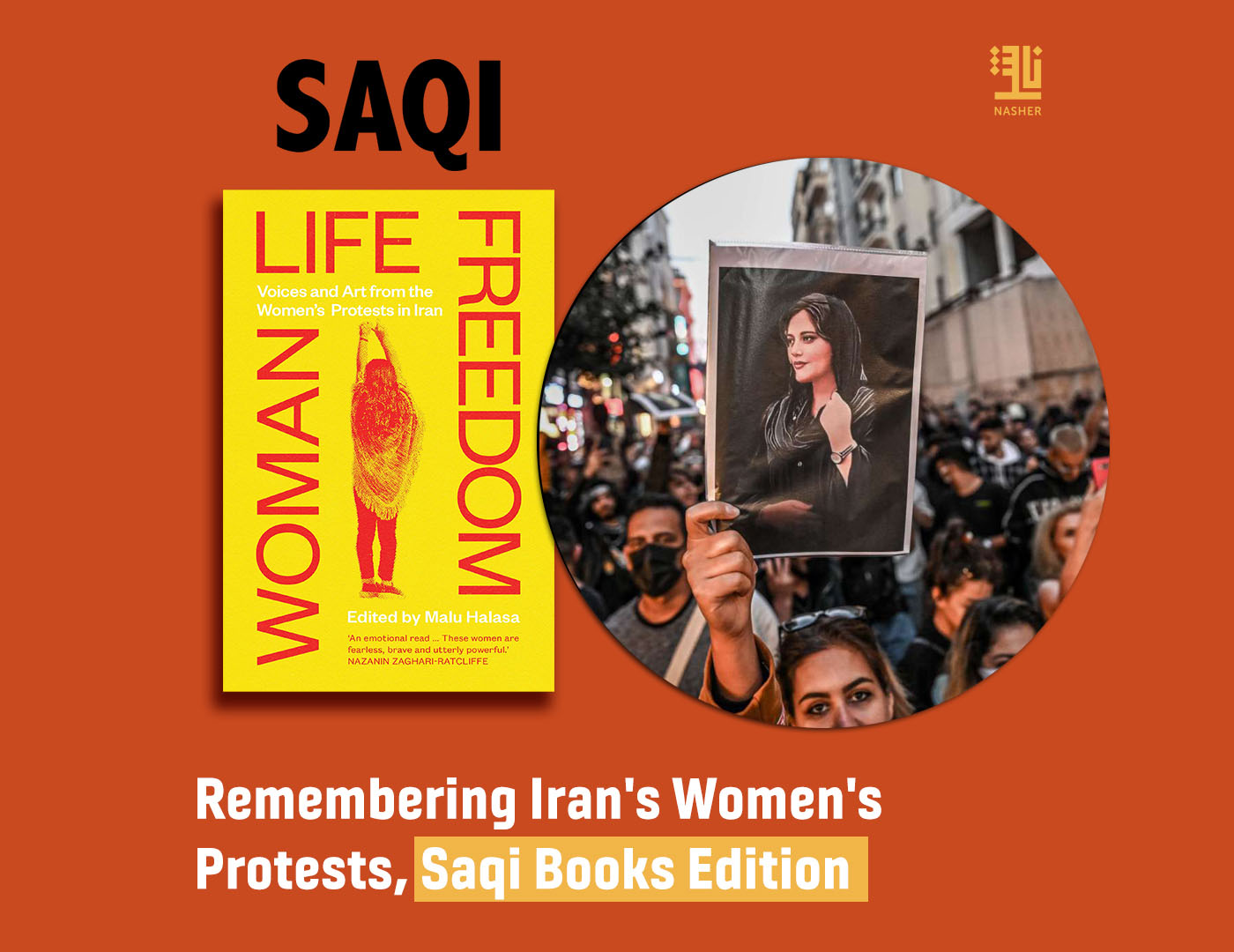Launch of Woman Life Freedom book on women’s protest in Iran at Rich Mix
SEPT 15 LONDON more info
In many ways Woman Life Freedom: Voices and Art from the Women’s Protests in Iran is a primer on gender and equality in the country. The anthology includes text, art and photography, which reveal the lives of women before and after the 1979 Islamic Revolution. The present-day women’s protests are not, as contributor and art historian of the subaltern Vali Mahlouji pointed out, the result of “oppositional political mandates, foreign adversaries or internal power struggles, but from individual citizens’ civil acts of human pleasure and delight: dances, songs, kiss-ins and liberally swaying bodies.” The first target of totalitarian regimes around the world has always been the body. This emphasis on personal freedom and joy has given the Iran women’s protests an undeniable staying power.
Art and music by and about women, and women’s athleticism, have also been key. In the protests the line between culture and activism has blurred. Simple acts such as rollerblading through Tehran streets to a rollicking soundtrack on social media, or graffiti of martyred women’s faces on city walls, show how resistance continues to thrive through small personal acts of expression. Last year at the height of then protests, women thwarted state surveillance and protected themselves from being identified, arrested and charged by the authorities; they covered CCTV cameras in Tehran’s metro with sanitary pads, an act celebrated in the artwork of editorial illustrator Roshi Rouzbehani. Personal intervention underpins the Woman Life Freedom revolution and has sustained the movement both inside the country and on the global stage of social media until today.
On the eve of the one-year anniversary of Jina Mahsa Amini’s murder in the custody of Iran’s morality police on September 16, 2022, Iranian authorities are once again arresting women who refuse to wear the hijab and harassing their families. Yet in some instances ordinary people come to the aid of these women. At a time when graves of women protestors killed by Iran’s security services are being desecrated by pro-regime forces, conservative clerics during the holy period of Muharram proclaimed from pulpits around the country that Iran faces harder challenges like a faltering economy and government corruption — not whether women wear or don’t wear a head covering.
The launch at Rich Mix will draw on the themes, ideas and activism of the women’s protests in Iran. The anthology’s art editor Emilia Sandoghdar will give an illustrated presentation on the art of the protests. The editorial illustrator Roshi Rouzbehani will present works she has made for and about the revolution, followed by an art intervention and performance by sound artist and activist Fari Bradley and painter Tasalla Tabasom. They will come together with curator Vali Mahlouji and the book’s editor, Malu Halasa, for a panel discussion about the nature of the protests and both domestic and global reactions to it; the value of activism at home and abroad; gender freedom in increasingly authoritarian times; and measuring impact and keeping the revolution alive in the here and now. The evening will close with Fari B’s sounds of Persia.
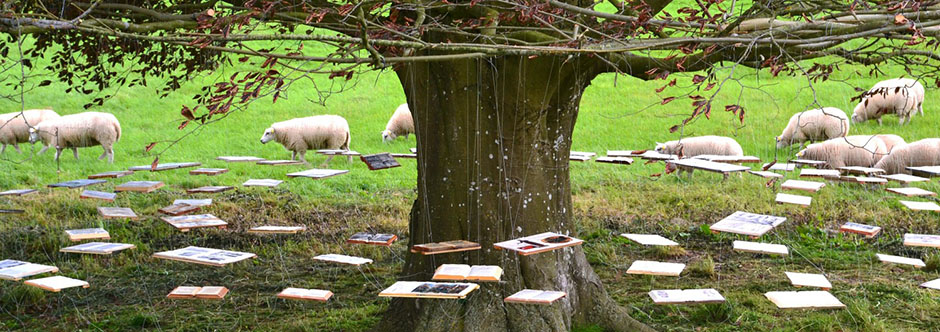
Those Who Remain in the Dark Exhibition @artllab Berlin
SEPT 15 BERLIN more info
“Those Who Remain in the Dark” is the third exhibition of the project “Warum lacht das Meer” (“Why is the Sea Laughing”), which presents works by artists whose works consider the self-perception and organization of workers. The title is a nod to Bertolt Brecht, whose work is central to David Krippendorff’s work “Kali” (2018). Krippendorff has the actress Hiam Abbass recite the song of the pirate Jenny from Brecht’s “Threepenny Opera” as a monologue in Arabic. Sirine Fattouh’s videos “A Night in Beirut” (2006) and “Another Night in Beirut” (2019) follow an old “tabbal” – a man who walks the streets of the city during the fasting month of Ramadan and wakes up those fasting so that they can have a meal before sunrise. Steen Rasmussen’s series “We Are Actually Real” (2011) shows images from the streets of Tibet and neighboring areas that highlight people’s everyday work in their improvised workplaces. As another homage to Bertolt Brecht, Frauke Schmidt-Theil is showing a series of oil paintings that reflect aspects of his theatre pieces.
Curated by Charlotte Bank and Salah Saouli, it includes artists :Sirine Fattouh, David Krippendorff, Steen Rasmussen, and Frauke Schmidt-Theilig.
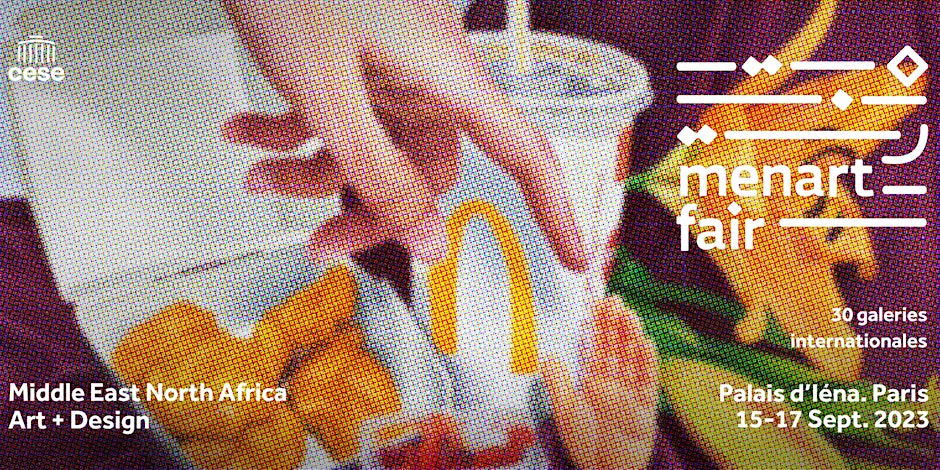
Menart Fair: Middle East North Africa Art + Design In Paris
SEPT 15—17 PARIS more info
The international modern and contemporary art fair celebrates artists from the Levant, Arab-Persian Gulf & North Africa. It is supported by many renowned museums and institutions around the world. Following the success of its last three editions (2021, 2022 in Paris, then 2023 in Brussels), Menart Fair is moving to the Palais d’Iéna, a historic 20th-century building and the headquarters of the Economic, Social and Environmental Council (CESE), considered a masterpiece of the architect Auguste Perret, for its 4th edition. Dance and music performances, but also round tables, a concert, a gastronomic area, and an off-site program will delight visitors!
“Despite all the complications and difficulties Lebanon is going through, the country remains a creative hotspot in the Middle East, both in terms of art and of collectible design. Eight Design galleries are taking part in this upcoming edition of Menart Fair,” said Joanna Chevalier, Artistic Director of the fair. North Africa will also be present with some exceptional selections, as will Saudi Arabia, the United Arab Emirates and Qatar. Eight galleries have chosen to present designers, some of them renowned and others yet to be discovered. There is a burgeoning generation of innovative designers: the scene is largely intercontinental, with some designers resorting to the cream of craftsmanship, while others are eager to embrace the latest technologies.
And, for the first time, Menart Fair will be welcoming exceptional works from 6 art foundations and international institutions: Farjam Foundation (Dubai), Afkhami Foundation (Dubai), iii museum (Zurich), Le Cercle de l’Art (Paris), Le Consulat Voltaire (Paris) and the Montresso Art Foundation (Marrakech).
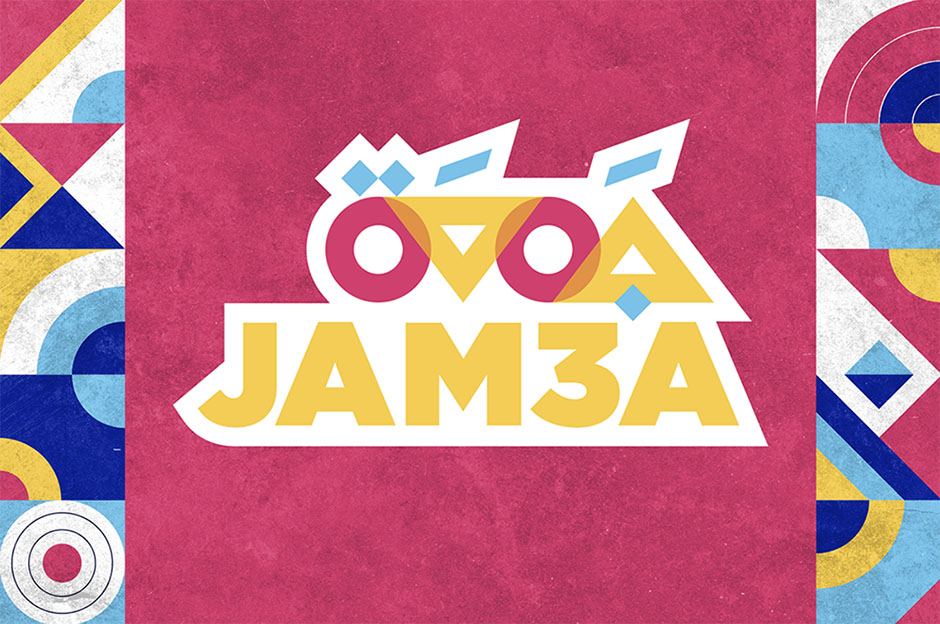
JAM3A Music & Arts Festival, Arab American National Museum in Dearborn, US (Hybrid event)
SEPT 16—17 DEARBORN more info
Jam3a, an Arabic word for “gathering,” is a free hybrid music and arts festival presented by the Arab American National Museum (AANM) in Dearborn, celebrating Arab talent, community and identity. Throughout the festival there will be free virtual film screenings, musical performances by renowned Arab artists and a curated in-person vendor market showcasing small artisan businesses. The fantastic roster of artists performing over the two-day festival include Emel Mathlouthi, Alsarah and the Nubatones, Farah Siraj, and Felukah among others. For the full list, click HERE.
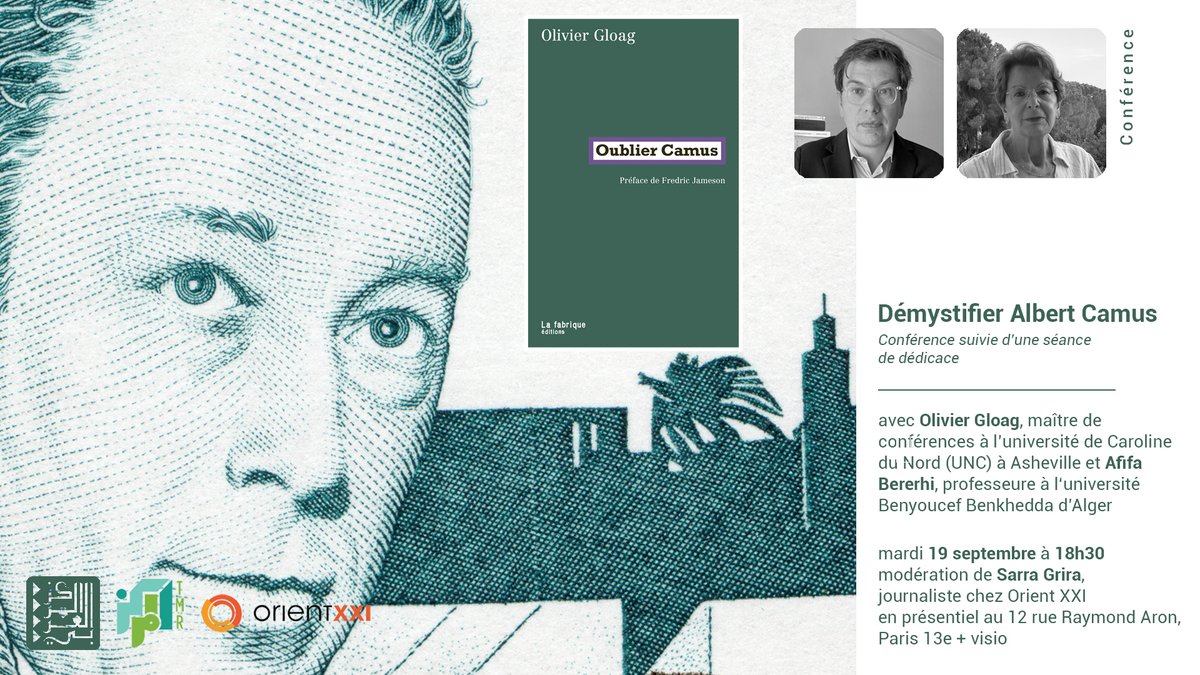
Débat, Démystifier Albert Camus avec Oublier Camus
SEPT 19 PARIS more info (en français)
Cette conférence-dédicace est organisée en partenariat avec The Markaz Review et Orient XXI. Elle se tiendra au CAREP Paris le 19 septembre 2023 à 18h30. Il est également possible de la suivre à distance. RSVP pour le Zoom/register here to participate online.
Avec Olivier Gloag, Afifa Bererhi d’Alger, et modératrice Sarra Grira, journaliste, rédactrice-en-chef d’Orient XXI.
Des programmes scolaires aux discours politiques, dans les médias et les conversations mondaines, Camus est partout le parangon d’un humanisme abstrait qui a ceci de commode – et de suspect – qu’il plait à droite comme à gauche. Peu de chercheurs se sont penchés sur les contradictions du personnage comme le fait Olivier Gloag dans son ouvrage Oublier Camus (La Fabrique, sept. 2023), à partir d’une relecture de Camus dans le texte – contradictions qui constituent pourtant la force motrice de l’œuvre camusienne, une clé de son « style », et expliquent sa popularité actuelle.
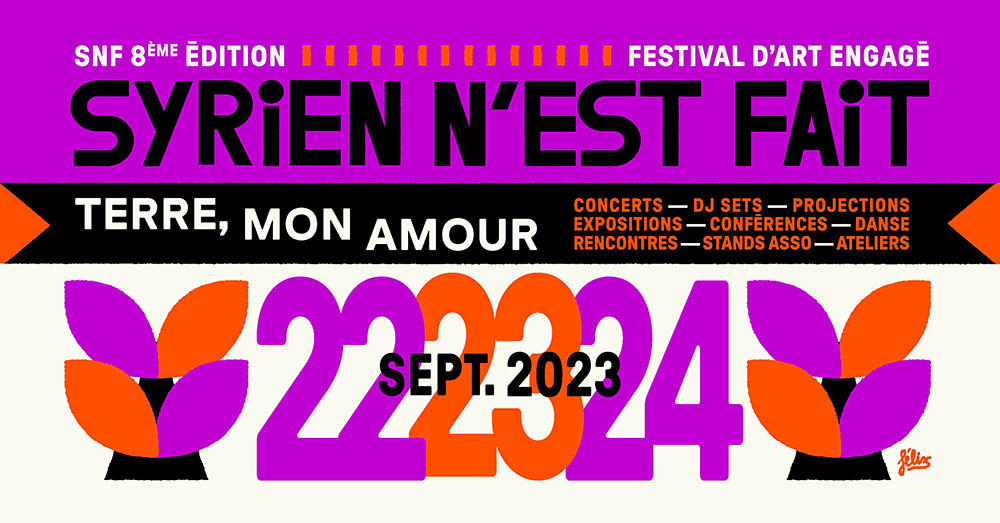
Sept 22—24 PARIS more info
Syrian Art Commemorates the Resilience of a People
As protests resume in some parts of the country, the multi-disciplinary festival Syrien n’est fait returns for its eighth edition of “Terre, mon amour” at Les Arches citoyennes and Hôtel de Ville in Paris.
After seven Parisian editions, held at Les Grands Voisins, the Syrian art festival Syrien n’est , which is nothing if not engaged, adds a new dimension this year. On the weekend of September 22, 23 and 24, it will take over Place de l’Hôtel de Ville (at Arches Citoyennes), and Salle Xavier Lacoste (located 5, rue Lobau inside the building), for three days of commemoration — a tribute to the life, resilience and hope of a people oppressed by decades of dictatorship and war.
Entitled “Earth, My Love,” this year’s edition celebrates the very essence of Syrian earth as a symbol of resistance and fertility, in the wake of the devastating earthquake that scoured the entire northern region of fissures last February. This year also highlights the complex role of agriculture in the Syrian context, revealing its tragic instrumentalization by the regime to weaken dissidents, but also its key role in the survival of besieged populations.
The theme explores the notion of “working the land” in a double sense. On the one hand, it evokes agricultural labor and know-how, passed down from generation to generation, which links Syrians to their ancestral land. On the other, the theme extends to the intimate link forged between working the land and the process of putting down roots in a territory. Many exiled Syrians have found that cultivating the land is a way of putting down roots in their land of exile.
Syrien n’est fait presents above all stories of solidarity and brotherhood woven through the darkest of times. Organized since 2021 by the volunteer collective SNF, this artistic rendezvous blends disciplines and narratives to tell a story of rebirth and transformation, through a varied program of events, featuring a wide range of musical performances, from the traditional oud of Hareth Mhedi to jazz, psychedelic and rock, as well as DJ sets with the famous Parisian station Radio Flouka.
Two documentary screenings invite the public to explore Syria through the lens of agriculture and the relationship with the land. Permanent exhibitions and installations also illustrate this subject through different visions, past and present, and in a variety of media.
Dance will also be on the agenda, with a performance by Yara al Hasbani, and an introductory workshop in traditional dabkeh.
Three conferences will punctuate the day on Saturday, Sept. 22: a discussion on the land as a source of resistance, accompanied by a bouquet of testimonials; a meeting with farmer-baker Nicolas Supiot, who will recount his journey to Syria, tracing the origins of wheat; and finally, a historical evocation of the “lost paradise” of Ghouta, near Damascus, by intellectual Farouk Mardam-Bey.
The public can also take advantage of bread-making initiation workshops, moments of collective creativity with a jam session and, last but not least, a remarkable new feature this year, a stand-up comedy show.
Throughout the festival, a rich culinary offering will be on offer: mezzes, saj, Syrian dinners with traditional dishes, not forgetting the Sunday brunch to delight the taste buds.
See program and registration links for festival activities.
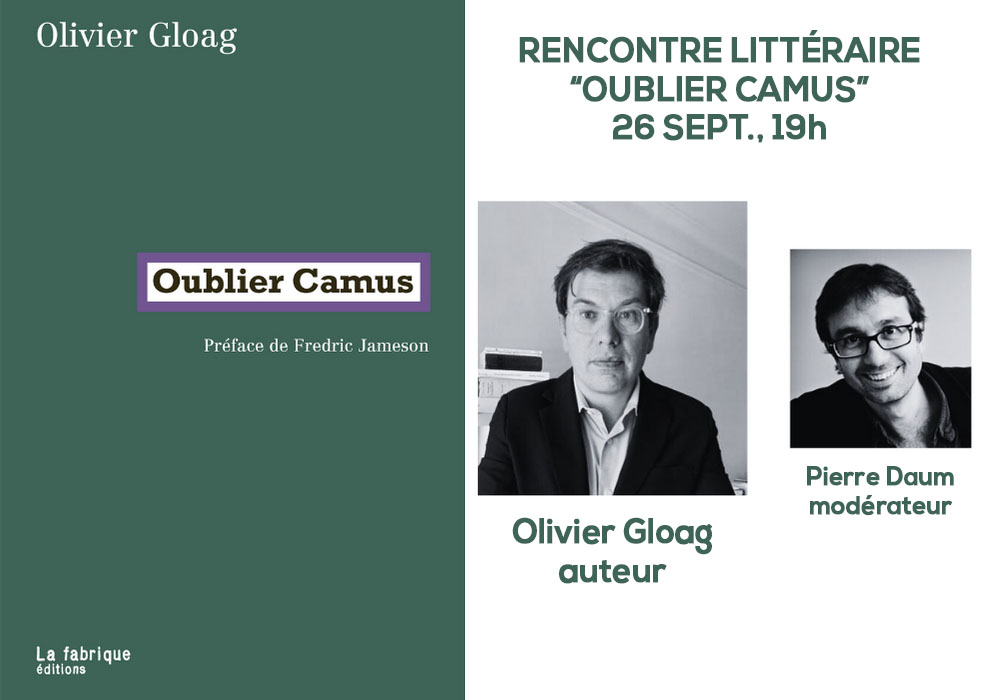
Rencontre Littéraire “Oublier Camus” avec Olivier Gloag à Montpellier
SEPT 26 MONTPELLIER more info (en français)
Cette conférence-dédicace est organisée en partenariat avec The Markaz Review et la librarie indépendente le Grain des Mots, avec l’aimable participation de La Fabrique de Paris. Mardi, 26 septembre, 19h au Librairie Le Grain des mots, 15 Bd du Jeu de Paume, 34000 Montpellier.Entrée libre.
Avec l’écrivain Olivier Gloag, modération de Pierre Daum, reporter au Monde Diplomatique, et auteur d’ouvrages sur le passé colonial de la France.
Olivier Gloag rappelle l’attachement viscéral de Camus au colonialisme et au mode de vie des colons qui traverse ses trois romans majeurs, L’Étranger, La Peste et Le Premier Homme. Il examine ses engagements politiques à la lumière de sa brouille avec Sartre : la tension entre révolte et révolution, son recours à l’absurde comme refus du cours de l’Histoire, son anticommunisme et son déni de la lutte des peuples colonisés. Il se penche enfin sur les récupérations de Camus : l’auteur le plus populaire en France et le Français le plus lu dans le monde est devenu un enjeu politique et idéologique. L’invocation d’un Camus mythifié projette un reflet flatteur mais falsificateur de l’histoire coloniale. C’est ce Camus-là qu’il faut oublier pour reconnaître les déchirements d’un écrivain tout aussi passionnément attaché aux acquis sociaux du Front populaire qu’à la présence française en Algérie.



